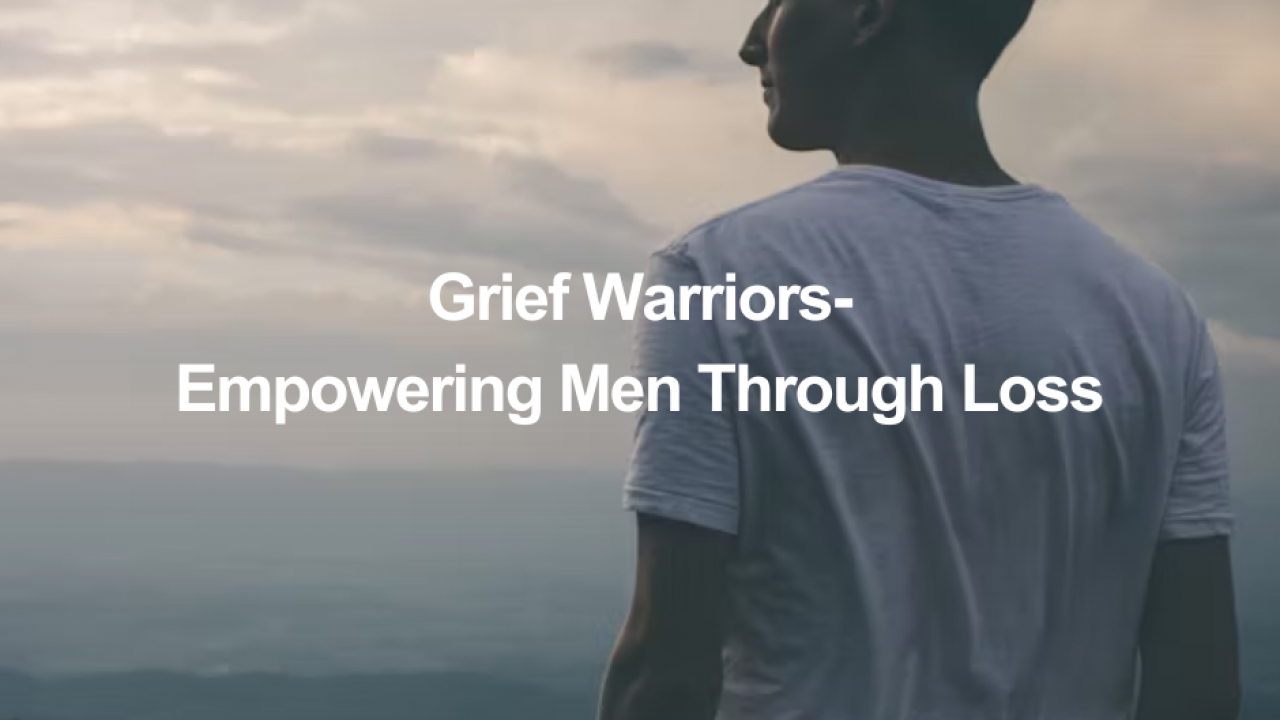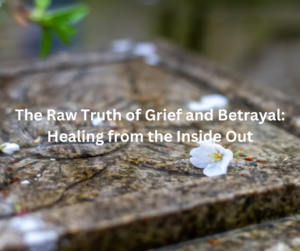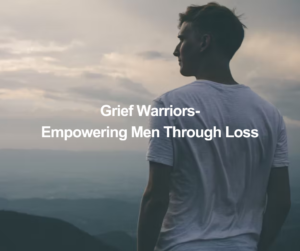Grief, in its rawest, most soul-ravaging state, hits a person like a rogue wave, unexpected and overpowering. It often strikes in silence for men, leaving them alone to navigate the tumultuous waters of loss. Society’s expectation for men to be stoic, to bear their pain with a stiff upper lip, can exacerbate this isolation and misunderstanding. The raw form of grief in men is a powerful and unique experience that demands a deeper understanding and a compassionate response.
In the quiet moments when the world is still, grief creeps in, wrapping around your heart like a cold, unyielding vice. It’s in the empty chair at the dinner table, the unfinished projects left behind, and the dreams that now seem out of reach.
Grief can feel like a storm raging inside you, tearing apart the foundations of your existence and leaving you gasping behind closed doors. It’s a profound, often overwhelming force that can bring even the strongest to their knees, a reminder that life is fragile and can be frequently irrevocably changed by the losses we endure.
But amid the heartache and despair, there is a glimmer of hope. Grief, as devastating as it is, also holds the power to transform us. It forces us to confront our deepest fears, acknowledge our vulnerabilities, and find a strength we never knew existed.
In the process, we learn to rebuild our lives from the ground up, piece by piece. This ‘rebuilding’ is not about forgetting or replacing what is lost but finding new ways to live and thrive despite the pain. We discover resilience in adversity and honor our losses by living with greater purpose and clarity.
In all its forms, grief is not just an end but a beginning—a painful yet powerful journey toward healing and self-discovery.
In this blog, we will delve into the unique challenges men face with grief, such as societal expectations, the ‘Silent Struggle,” and the impact on their physical and mental health. By understanding these challenges, men can better navigate the path to healing and find solace in a supportive community.
Grief is not a sign of weakness but a testament to your love. Face it with courage, let it shape you, and rise from it with a heart forged in the fire of resilience, an inner power that will heal down to the depths of your soul.
The Silent Struggle

This ‘Silent Struggle’ is a unique challenge many men face, as they may feel societal pressure to remain strong and not show vulnerability.
They may feel an intense need to remain strong for their families and be the rock others can lean on.
This self-imposed stoicism can lead to a profound sense of isolation. Men may feel like they have to bear their grief alone, without the support or understanding of others. This isolation can deepen their pain and make the healing process more difficult.
Grief can arise from the loss of many things: A way of life, traumatic experiences that have forever changed their life, a death, a disability, a diagnosis, a war that cannot be won, and regrets that run deep. Below is a true story. Feel free to change the name and the loss. See if there are any similarities that compare to how you feel.
Jared, a thirty-year-old father who recently lost his six-year-old son to someone who was texting and driving, found himself losing hope in a sea of sorrow. He kept his feelings bottled up, fearing that expressing them would make him appear weak. His nights were sleepless, filled with haunting memories and unanswered questions. By day, he wore a mask of normalcy while his heart silently shattered.
He went to work, which once had been a place of camaraderie and purpose, now feels like a foreign land. Sensing his withdrawal but unsure how to help, his colleagues offered their condolences but quickly moved on, leaving this man more isolated. Every task felt monumental; every meeting was a blur of voices and faces without meaning. His productivity plummeted, and his boss’s concerned glances turned into impatient sighs.
Jared found it increasingly difficult to concentrate at work. His mind constantly drifted to memories of his son, and consequently, he made frequent mistakes on essential projects. His boss noticed the decline in his performance, and despite understanding the situation, the pressure to perform eventually led him to consider taking a leave of absence to cope with his grief. Jared soon began experiencing chronic headaches, gastrointestinal upsets, joint pain, and severe fatigue.
His grief disrupted his sleep, and he found solace in junk food and alcohol. As his physical health declined, he struggled to keep up with work and personal responsibilities, which only deepened his sense of helplessness.
At home, the silence was deafening. The once-lively house now felt like a mausoleum. Jared’s wife, dealing with her own grief, seemed like a distant stranger. Their conversations were strained, each afraid to break the other with their pain. Their daughter, too young to fully grasp the loss, often found her father staring blankly at his phone, his eyes hollow and distant.
Jared’s friends, unsure of how to reach him, began to pull away, leaving him to navigate his grief alone. He found himself increasingly turning to substance abuse, a temporary balm for the unrelenting ache, which left him feeling even more detached from reality. The nights he could sleep, he woke up groggy and guilt-ridden, knowing this was not the path his son would have wanted for him.

“ Good night, Dad, don’t forget I wove you.” The weight of his grief pressed down on him, and he finally allowed himself to cry, a raw, guttural sob that shook his entire body.
In that moment of vulnerability, he realized he could no longer bear the burden alone.
Determined to find a way out of the darkness, Jared took a brave step and reached out to a grief counselor. The first few sessions were excruciating; each word felt like tearing open a wound. But slowly, he began to unravel the tightly wound ball of sorrow and anger that had consumed him. He learned that acknowledging his pain was not a sign of weakness but a testament to the love he had for his son.
As he continued therapy, this man started incorporating healthier coping mechanisms into his life.
He began running and working out, pounding the pavement with a fury that gradually transformed into a therapeutic release while trying to mend a heart shattered by loss. These physical activities helped him stay physically fit and served as a healthy outlet for his emotions, aiding in his healing process.
Soon, he found solace in writing, pouring his heart out in letters to his son and sharing his journey in a grief support group, where he met other fathers who had experienced similar losses.
This man’s relationship with his wife began to heal as they opened up, sharing their pain and supporting one another.

His productivity gradually returned, and he found new meaning in his work that progressed his daily healing.
Through these steps, this man discovered that grief, though an inevitable part of love, did not have to define him. He learned to carry his son’s memory not as a weight that dragged him down but as a light that guided him forward.
Though his journey was far from over, he found himself a little stronger, more grounded, and more connected each day to the world around him.
After finding the right tools, Jared realized how these buried emotions can affect every aspect of life.
The Top 10 Behaviors of Grief Experienced by Men

Withdrawal: Some men withdraw from social interactions, believing that solitude will protect them from further pain and display their fears.
Distraction: Grief can lead to becoming preoccupied, over-socializing, or numbing out with screen time, which is often a coping mechanism to keep the mind busy and avoid confronting painful feelings.
Anger and Frustration: Grief can manifest as anger. Men might lash out, not because they are truly angry, but because it’s a common emotion when grief becomes a feeling of despair, hopelessness, and a loss of control.
Substance Use: Turning to alcohol or drugs as a way to numb the pain is not unusual. It provides a temporary escape but often exacerbates the problem.
Emotional Detachment and Relationship Strain Grief can cause men to detach from those around them emotionally. The fear of appearing vulnerable often leads to suppressing emotions, resulting in a lack of communication and intimacy with loved ones. This detachment can strain relationships, creating a chasm between men and their partners, children, and friends. Over time, this can lead to misunderstandings, resentment, and further isolation.
Career Impact and Professional Challenges: Grief can significantly impact a man’s professional life. The emotional and mental burden can reduce productivity, focus, and motivation. Men may find it challenging to meet work demands or make important decisions, leading to decreased job performance and even jeopardizing their careers.
Overworking and Hyper-Focusing on Tasks: Grief can drive men to immerse themselves in other tasks to avoid their emotions. By overloading their schedules and focusing intensely on work or hobbies, they can temporarily escape the pain of their loss and avoid having conversations about their feelings.

Recognizing these impacts is crucial in providing the proper support and resources for men navigating the debilitating journey of grief.
Trying to heal without support while attempting to distract yourself with work is like navigating a stormy sea without a compass—leaving you adrift and vulnerable to the overwhelming waves of grief and pain.
What can be done to initiate a rugged and in-depth healing journey is finding healthy outlets that create safe spaces for sharing experiences and provide access to practical tools and community support for healing and recovery.
Note- The number one reason grief is so hard to heal is that it forces us to confront deep emotional pain and vulnerability, challenging our sense of stability and control.
Breaking the Chains: Five Solutions for Healing

Acknowledge Your Grief
The first step towards healing is acknowledging your grief. For a man, this is an act of true bravery. Every day, men must face the world with a stoic front, but true strength lies in embracing our vulnerabilities. To experience the pain without judgment is like shedding the armor that weighs us down, revealing the raw, authentic, vulnerable self beneath and allowing the healing light to reach our wounds.
Engage in Physical Activity
One of the best ways to release anxiety is through exercise. Movement can be a powerful outlet for pent-up emotions. Physical activity, such as running, yoga, or hiking, can help release stress, improve mental well-being, and provide a means to process anger and sadness.
Create Rituals of Remembrance
Honoring a loved one, acknowledging a significant loss, or releasing a traumatic experience can provide comfort. Try experimenting with breathwork and meditation, sound healing, creating art, or setting aside time each week to engage in healing practices that engage the soul to feel.
Daily journaling is an incredible practice that provides a safe and private outlet for expressing and processing emotions, understanding your grief, and gaining personal growth.
Consider Professional Help
Sometimes, grief can be overwhelming, and professional help is needed. Therapists and grief coaches specializing in grief can provide strategies and support to navigate this difficult journey by facilitating how to unravel the complex emotions you may be experiencing, such as sorrow, anger, guilt, confusion, regret, and hopelessness.
Set Aside Time for Reflection
Allocate specific times to reflect and journal about feelings and experiences. This can make sharing how you feel more structured and manageable. Reflection can also help build confidence in expressing deeper emotions later on.
Build Resilience and Perseverance

You are not alone. Gathering warriors to support you in grief can lead to profound transformative healing and empowerment.
Seeking support is a courageous step towards reclaiming inner strength, which can change your life and help you understand difficult emotions.
Nursing Note: Grief Coaching does not have to be in a clinical environment. It can occur in a comfortable, familiar setting such as a home, a favorite outdoor location, or even virtually, allowing for a more personalized and supportive experience.
First, grief coaching provides a solid support system where your struggles are understood and your journey respected. You will have reliable, experienced support that recognizes the pain you are experiencing and helps you navigate through grief with tools, strategies, and resolve.

Second, grief coaching equips you with practical, actionable steps that can be implemented today. It’s not just about talking; it’s about doing. You’ll learn effective ways to manage your emotions, stay focused, and become prepared for those unexpected waves of intense grief. These tools will empower you to handle grief’s challenges with resilience and determination, making you stronger and feeling more grounded.
Lastly, grief coaching fosters a profound sense of personal growth. This journey isn’t just about overcoming sorrow; it’s about discovering the depths of your wounds and how they affect your life and those around you.

Working through grief is not about surviving; it’s about building a strong future equipped to endure what lies ahead.
Healing requires knowledge and a plan.
This transformative journey will revolutionize every part of your life.
It’s a declaration that you are worthy of healing, hope, and grace. Let this time be a testament to your determination to find meaning in what you are grieving. In seeking the pathways required to heal, you are not just finding a way to get through the darkness alone—you are rebuilding yourself for triumph and resolve, a foundation of truth that heals the soul.
This is a uniquely challenging quest, especially for men who struggle to express their emotions. As mentioned earlier, it’s often hard for men to share their feelings of grief due to societal expectations and fears of appearing vulnerable, being judged, or burdening others with their emotions.
It’s essential to recognize that healing from loss requires different tools and approaches tailored to individual needs. While one person might find solace in counseling, another might benefit from support groups or creative outlets like writing, art, or creating, mixed with healthy amounts of alone time to process. The key takeaway is to explore and embrace the methods that resonate most with you, ensuring a personalized plan to heal your grief.
You have the power within you to speak your truth and seek the support you need—your healing journey begins with this brave step.

Everything you do affects another: cause and effect.
Healing, like unresolved grief, is an energy that others can feel.
In closing-It is imperative for those who have endured traumatic events to find healing before it manifests into deeply harmful ways, affecting mental, emotional, and physical health that further diminishes self-worth.
This journey is not about forgetting what happened. It’s about going deep within your soul and finding what is hurting, giving it the love and attention it needs by allowing yourself to express what you feel, have seen, heard, or been part of, and releasing it.
Seek what you need. There is a saying that states, “When the student is ready, the teacher will appear.” You never know what or who that teacher will be.
With Much Love,
Stella Rose, BSN





